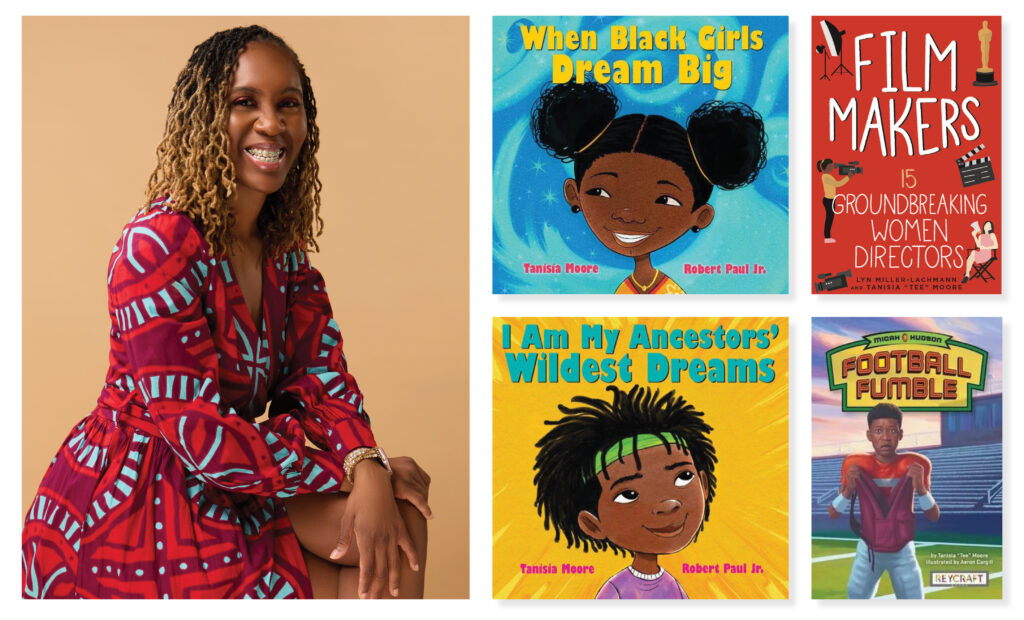“Books are a gateway to history and culture. They spark curiosity and dialogue between kids and caregivers.”

This Black History Month, Reach Out and Read is spotlighting author Tanisia Moore, whose books bring Black culture, joy, and history to life on the page. Tanisia’s children’s books offer a powerful opportunity for young readers to both see themselves reflected in stories and to build empathy and find shared humanity with others. Her work parallels Reach Out and Read’s commitment to diverse and culturally responsive books that serve as mirrors and windows, showing children both their own communities and the colorful world around them.
Q: What inspired you to become a writer? What message did you hope readers would take away from your books?
A: Books have always been my escape, whisking me away on unforgettable journeys. The power of a story to linger in my mind long after the last page inspired me to become a writer. I wanted to create that same magic for others. It wasn’t until I had my children that I truly pursued this dream. They reignited my passion and pushed me to write children’s books, even though adult romance is my sweet spot. Through my writing, I aim to inspire readers to chase their dreams and believe in their own stories.
Q: Did your parents or caregivers read with you as a young child? If so, can you share a favorite memory?
A: My mom is the reason I love audiobooks — because they totally count as reading! She’d play mystery audiobooks on our long road trips from Southern to Northern California. The narrator’s voice brought the stories to life, and I’d pepper my mom with questions about the plot. She’d break down the whodunit with such enthusiasm. Even now, when I find a great mystery, I share it with her so we can listen together and try to solve the mystery.
Q: Your books celebrate Black culture, characters, and joy. Can you share a specific historical moment or figure that influenced your writing? What about more modern inspirations?
A: Growing up in the ’90s, I devoured “Nancy Drew” and “The Babysitters Club.” But high school introduced me to my mom’s Eric Jerome Dickey romance novels. His authentic characters and storytelling style left a mark on me. His writing style influenced mine and gave me the confidence to write authentic stories. Today, I’m inspired by Jacqueline Woodson, Jason Reynolds, Kristina Forrest, and many others.
Q: Why do you believe reading is important for young children?
A: When my oldest daughter was 2, we noticed her speech was behind. We built her an at-home library, and one book, “Honey Bunny,” lit up her world. She began reciting the words, and I saw firsthand how reading developed her speech. Reading is crucial for empathy, cultural understanding, and tackling complex topics. Likewise, reading helps to develop speech and assists in developing a child’s vocabulary. It’s a lifeline — unlike trigonometry, reading is a daily necessity.
Q: What impact have you seen or experienced when children read stories that reflect their own backgrounds and experiences?
A: When kids see themselves in stories like “I Am My Ancestors’ Wildest Dreams,” it’s magic. Hearing a child say, “That boy looks like me!” melts my heart. I feel a deep responsibility to write stories where Black children are the main characters. It affirms their greatness and encourages them to believe, feel empowered, and be emboldened. And quite honestly all children deserve to be seen and represented well in publishing.
Q: How do you think books can help build empathy and understanding among children from different cultural or racial backgrounds?
A: Books open the door to tough conversations. They let kids ask why certain things happened to specific groups and show that despite our differences, we’re all human and deserving of respect. Our uniqueness is celebrated, but our shared humanity unites us.
Q: In the context of Black History Month, how can parents use books to teach children about Black history and culture?
A: Books are a gateway to history and culture. They spark curiosity and dialogue between kids and caregivers. Black History Month is a perfect time to learn about the contributions made by Black Americans. Books serve as a starting point for such exploration. For example, my books, “I Am My Ancestors’ Wildest Dreams” and “When Black Girls Dream Big,” offer nuggets of information that encourage a deeper study of each person mentioned in the text. They’re designed to inspire readers to learn more about the figures who pique their interest. Additionally, my books come with an activity guide that is meant to offer further insight and allow children to think of how they are their ancestors’ wildest dreams.
